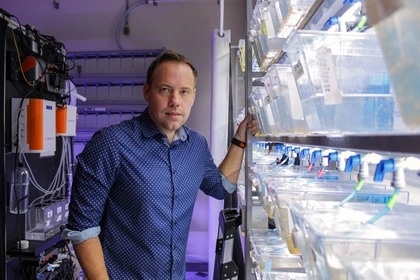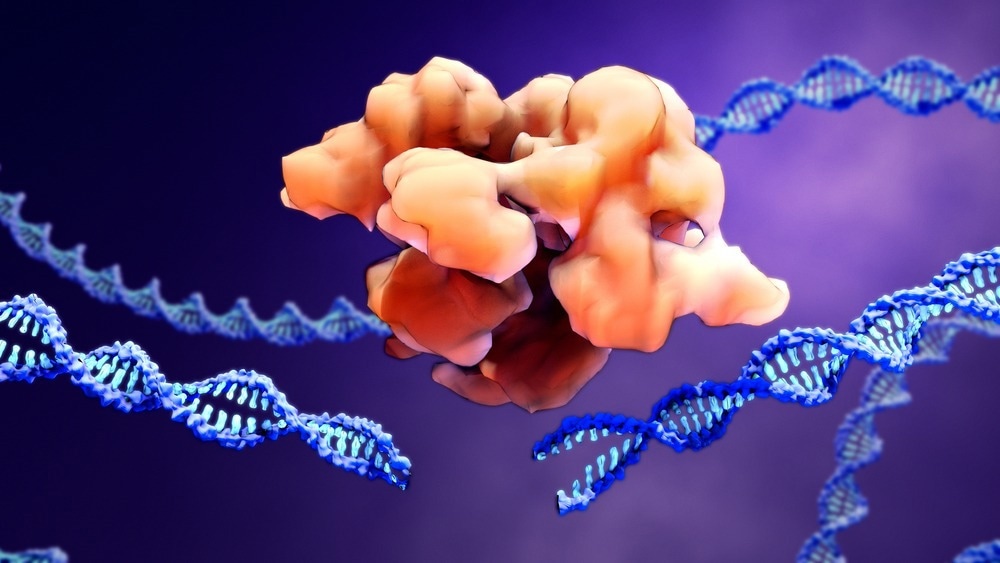Reviewed by Danielle Ellis, B.Sc.Jun 6 2023
Recent research conducted by Phillip Cleves of Carnegie employs sophisticated CRISPR/Cas9 genome editing technologies to identify a gene essential to stony corals’ capacity to construct complex reef designs. Proceedings of the National Academy of Sciences published this.
 Phillip Cleves at work in Carnegie’s coral research facility in Baltimore. Carnegie researchers have been leading efforts to apply biomedical techniques to pressing environmental issues, including coral bleaching and ocean acidification. Photo by Navid Marvi courtesy of the Carnegie Institution for Science. Image Credit: Carnegie Science
Phillip Cleves at work in Carnegie’s coral research facility in Baltimore. Carnegie researchers have been leading efforts to apply biomedical techniques to pressing environmental issues, including coral bleaching and ocean acidification. Photo by Navid Marvi courtesy of the Carnegie Institution for Science. Image Credit: Carnegie Science
Marine invertebrates called stony corals construct massive skeletons that serve as the framework for reef ecosystems. A quarter of all marine species that are known to exist are found in these biodiversity hotspots.
Coral reefs have tremendous ecological value. But they are in decline due to human activity. Carbon pollution that we spew into the air is both warming oceans—causing fatal bleaching events—and altering seawater chemistry—resulting in ocean acidification that impedes reef growth.”
Phillip Cleves, Staff Scientist, Biosphere Sciences & Engineering Embryology, Carnegie Science
The extra carbon dioxide that burning fossil fuels releases into the atmosphere is eventually absorbed by the ocean, where it combines with the water to generate an acid that is harmful to coral, shellfish, and other marine life.
Stony corals are particularly susceptible to ocean acidification because they build their skeletons through the calcification of calcium carbonate, a process that gets more challenging as the pH of the surrounding water lowers.
Understanding the genes governing the procedure and how it has developed in corals has been a key research priority since coral skeleton production is crucial for creating reefs.

Image Credit: Design_Cells/Shutterstock.com
The Cleves lab has been using the Nobel Prize-winning CRISPR/Cas9 technology for several years to pinpoint cellular and molecular mechanisms that might direct coral conservation and restoration initiatives.
For instance, scientists previously discovered a gene that plays a crucial role in a coral’s response to heat stress, which could help determine how corals can cope with upcoming bleaching events.
Now, his team, which included Amanda Tinoco from Carnegie, utilized genome editing tools to discover that a specific gene called SLC4γ is necessary for young coral colonies to start constructing their skeletons. It is responsible for moving bicarbonate across cellular membranes through the protein it encodes.
It is interesting to note that SLC4γ is exclusively found in stony corals and not in their relatives that do not construct skeletons. These findings collectively suggest that the new gene SLC4γ was employed by stony corals to evolve skeleton formation.
Cleves concluded, “By applying cutting-edge molecular biology techniques to pressing environmental problems, we can reveal the genes that determine ecologically important traits. In developing these genetic tools to study coral biology, we can greatly improve our understanding of their biology and learn how to mount successful conservation efforts for these fragile communities.”
Cleves was chosen by The Pew Charitable Trusts earlier this year as one of seven recipients of the 2023 Pew Fellowship in Marine Conservation and the first researcher to earn the organization’s Marine and Biomedical Science Fellowship.
This initiative funds studies that utilize methods or tools more frequently seen in biomedical science to improve marine conservation.